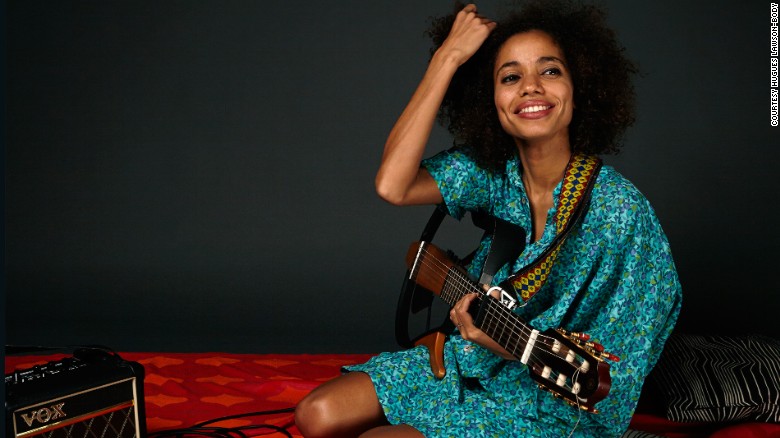Nneka: Nigeria's soul superstar is back - and as outspoken as ever.
Story highlights
- Nigerian singer Nneka releases latest album, "My Fairy Tales"
- She combines reggae and afrobeat with powerful lyrics tackling politics, love and forgiveness
(CNN)Wrapped
up in a long brightly-colored scarf, which does little to contain her
free-flowing curly hair, Nneka sits back quietly as she tries to bring
to mind her very first memory of music.
"I was a kid," the Nigerian singer finally says, her thoughts traveling back to Warri, the Niger Delta city where she grew up.
"While I was doing my domestic work in the house, sweeping, waking up
at 5am in the morning, there was this bird [singing] -- and I never
forgot the melody," she continues, breaking a warm smile. "Funny wise,
like 25 years later I was in Lagos and I heard the same melody -- it was
amazing!"
Nneka's first musical
recollection might be firmly rooted in her birthplace, but the
award-winning singer's career was destined to begin thousands of miles
away from home -- the daughter of a Nigerian father and a German mother,
Nneka moved to Hamburg at the age of 19 to study anthropology. Whilst
attending university, she also started exploring her musical talents,
and soon found herself performing in various clubs opening up for top
reggae and hip-hop names.
In 2005,
she released "Victim of Truth," a much-lauded debut that fused soulful
beats, tasty hip-hop-and reflective ballads with politically-charged
lyrics and black consciousness. Since then, she went on to enjoy further
chart success, tour extensively and collaborate with global stars like
Lenny Kravitz and Damian Marley.
And now, the soulful singer is back with a brand new, self-released
album -- "My Fairy Tales" is a formidable collection of rich afrobeat
grooves, reggae-tinged beats and uplifting rhythms that reaffirm her
place as one of the continent's most exciting -- and relevant --
artists.
CNN's African Voices
caught up with Nneka in London to talk about music, memories and the
current situation in Nigeria -- as well as present her with the
questions you sent via the #AskNneka and #CNNAfrica hashtags.
CNN:
In the past, you've dealt with issues ranging from the environment and
politics, to religion and love -- what are the themes that you're
emphasizing at this moment?
Nneka:
What is happening in Africa at present concerns me a lot. Boko Haram
has always been an issue obviously for the past five, six years -- funny
wise, there's a track in the album called "Pray For You" which I
recorded when not too many people knew what was going with Boko Haram in
the West.
I'm
talking about the problems and possible solutions, and what are the
reasons for the problems that we have. We as Nigerians, we're not
united, that has always been the issue... that's our problem, tribalism,
and what belongs to whom.
I also talk
about children and the future, bringing children into this world...
Everyone's living in a cage and then you bring your child into that kind
of society, where your child is forced to live in fear.
People
are afraid to express themselves politically, and even in their home --
I remember the way we grew up, I didn't look my father in the eye until
I was 22; you call your father "Sir, Sir, Sir" -- apparently it's a
form of respect, OK, but respect should not be mistaken with fear. I was
afraid and that's the thing, that's the colonial mentality: we mistake
fear for respect.
Nneka on the postponement of Nigerian elections
He
[Goodluck Jonathan] says he wants to tackle Boko Haram, obviously every
Nigerian is asking why now, he could had done it a long time ago...but
I'm not good at the whole blaming game, I don't want to blame anybody
but I pray that he comes up with a good idea for us if he is an honest
and genuine guy. But I know that Fela [Kuti] would definitely not be
cool with him, Seun [Kuti] is not cool with him, and many other
musicians who are very outspoken are not cool with him.
CNN: What is the power of music and how can it influence things to bring positive change?
Nneka:
Music is very powerful, music is big; music is even more powerful than
politics at present. Beyonce would definitely draw more crowd than
[Nigerian president] Goodluck Jonathan if she was going to hold a speech
-- if Beyonce is going to talk about Boko Haram, many people are going
to listen, and if she had something to tell Nigerians about love or
whatever, many people are going to listen.
CNN: How do you see the political and security situation now in Nigeria?
Nneka:
All I can say is that we do need proper leadership. Yes, that's just
easier said than done, but we also need ourselves to take more things
into our own hands -- so if we want change, we have to show that we want
change, peacefully -- I love Malcolm X but I'd rather go for
Martin Luther [King] -- peacefully. And be part of it, not just blame
our leaders and making sure that you, yourself, contribute to the change
that you want to see.

YOUR QUESTIONS
Nneka: My
personal life always inspires me, in the first place, and then I try to
expand it to the world. I try not to go too personal so that people can
have their own interpretation of the song and also relate to it in their
own special way.
Nneka: I like
The Prophet by Kahlil Gibran, I like Things Fall Apart by Chinua
Achebe, I like the Bible. Right now I'm reading The Humans by Matt Haig.
Read! Just read, educate yourself!
Nneka: The
way forward is going to be easier said than done, but tribalism is not
they key. What we need is unity and to appreciate each other as
Nigerians, as Africans, regardless of tribe and regardless of religion
-- imposing your religion on other people is only going to create war
and turmoil, there has to be another way.
Nneka: Being
on tour for like five months; I mean you get used to the life, but [it's
hard] when you're coming back home and then realizing that people move
on when you're not around.
Nneka: It is
successfully already, that's why everybody is in it. That's all I can
say to that, it's flourishing and they know it's flourishing and that's
why they're all there -- the Chinese, the Americans, the Europeans and
the rest of them.
cnn.
